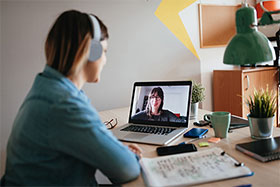WORKING EFFECTIVELY

- Invest in a fast internet connection, especially if you have video calls. A good connection looks more professional. You do not want to be the one who is always derailing meetings. Close large software and competing virtual meeting programs while on video calls to minimize glitches.
- Communicate. Do not assume your manager or your team knows what you are doing. Work out loud when you can, sharing your progress with your team as you go. And if you do not send your boss regular updates, that is a good idea too.
- Be disciplined in your work habits. This means keeping a regular schedule and being available when your colleagues need you. For some people, being disciplined about work also means dressing professionally every day.
- Set up an “office.” On days when you are working remotely, you do not have to have a separate room devoted to work, but it can be helpful to have a dedicated space that you think of as where you “go to work.” If you do not have a room you can use, carve out a distraction-free zone where you can get some privacy, like the corner of a bedroom where you can close the door.
- Be aware of your surroundings. If you are on video, try to keep your background uncluttered. If you are working in the bedroom, angle your desk so the bed does not show up on video — especially if it is unmade. If you have a window behind you, you are going to show up as a dark silhouette, so be sure you have some light on your face.
- Know your audience. We have all seen that video where the toddler wanders into the room while dad is on a high-stakes video call. There are times when it is perfectly fine for a child or pet to make an appearance (in fact, at times this can help build important personal relationships with close team members). But for all those other times, be sure to keep your office door closed — and securely latched. And keep in mind, the mute button is your friend.
MAKING SOCIAL CONNECTIONS
 Having close friends at work is important to both your job satisfaction and productivity. Building those relationships can be harder at a distance, so:
Having close friends at work is important to both your job satisfaction and productivity. Building those relationships can be harder at a distance, so:
- Create a virtual water cooler. This is part of building personal relationships. When you are at home, you miss out on those casual, drive-by encounters where you chat about work, TV shows, or something cool you are reading. These days, you can create a virtual water cooler through common persistent chat software such as Microsoft Teams. Start a watercooler channel where you share links, observations, personal stories.
- Raise your hand. Sometimes it can feel like it is “out of sight, out of mind” when you are working at home. To maintain your profile, get involved wherever you can, including committees, affinity groups or special projects. Research shows people who volunteer do better in all aspects of their well-being, including work, health, money, and life in general.
- Get personal. Remote meetings do not have to be 100 percent transactional. When appropriate, take time to ask about your colleagues' lives or share something personal to break the ice. To form closer relationships, consider taking walk-and-talk meetings or scheduling virtual coffee or lunch over video. If you can get into the office occasionally, schedule casual in-person meet-ups where you can talk anything-but-shop.
STAYING HEALTHY
 When it comes to health, you will want to lean into the good things — the flexibility to take more time for yourself, get some exercise, and eat healthy.
When it comes to health, you will want to lean into the good things — the flexibility to take more time for yourself, get some exercise, and eat healthy.
- Create a virtual water cooler. This is part of building personalrelationships. When you are at home, you miss out on those casual, drive-by encounters where you chat about work, TV shows, or something cool you are reading. These days, you can create a virtual water cooler through common persistent chat software such as Microsoft Teams. Start a watercooler channel where you share links, observations, personal stories.
- Get up and move. Without a commute to get you moving in the morning and the evening, it is too easy to be sedentary all day. Use what would have been your commute time to get some exercise or go out and walk for 30 minutes at lunchtime.
- Do not work too close to the fridge. You want to get up from your desk regularly throughout the day ... but not to walk to the kitchen every time. This is a case in which “out of sight, out of mind” is probably a good thing.
- Relax and let your work speak for itself. If you are getting your work done and doing a good job, there is no need to worry. You can step away to refresh your coffee or make lunch without worrying that someone will think you are shirking your responsibility. You would not be working from home if your manager did not trust you. Do not betray that trust, but don't feel like you have to be chained to your desk to keep proving you deserve it.
- Ergonomic Considerations: EH&S Ergonomic resources for working remotely can be found here: Ergonomics for remote work FAQs. If you need an ergonomic evaluation, submit a Remote Work Ergo Request Form.
*Adapted from Duke University and Fidelity Investments Employee Value of Benefits Research




 Having close friends at work is important to both your job satisfaction and productivity. Building those relationships can be harder at a distance, so:
Having close friends at work is important to both your job satisfaction and productivity. Building those relationships can be harder at a distance, so: When it comes to health, you will want to lean into the good things — the flexibility to take more time for yourself, get some exercise, and eat healthy.
When it comes to health, you will want to lean into the good things — the flexibility to take more time for yourself, get some exercise, and eat healthy.